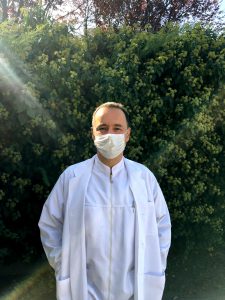By Dr. Mete Salih Aker
Since the beginning of March, all of us have been going through a difficult period due to the COVID-19 pandemic. Over time, we’ve learned what we need to do with respect to improving hygiene, wearing masks, and following social distancing guidelines. By adjusting our lifestyles to comply with those requirements, we can to a great extent protect ourselves and those around us.
But is that enough? Is there anything else can we do? What issues should we be aware of?
First of all, we can start by reducing possible risk factors. If we use tobacco products, if we have chronic lung or heart disease, diabetes, or uncontrolled high blood pressure, our risk of developing COVID-19 and of experiencing more severe symptoms of the disease may be higher than that of the general population.
For those of us who use cigarettes or other tobacco products, there isn’t a better time to quit. For those of us who don’t smoke, let’s try to stay away from environments where smoking takes place. In or near the few places where smoking is permitted on our generally smoke-free campus, let’s keep at least 2,5 meters of distance between us and those who smoke regular or electronic cigarettes.
For those of us with diabetes, high blood pressure, or heart or lung disease, we should continue to take the medications prescribed by our doctor as directed.
Controlling our weight can also help us stay healthy, so let’s adopt a Mediterranean type of diet that has a low glycemic index and features balanced proteins, healthy fat and plenty of fiber, without a lot of preservatives.
Although we know that SARS-CoV-2 is not transferred through food, we still have to take off our masks while eating. So, when we temporarily forgo the protection of a mask in order to meet our basic need for nutrition, if we’re eating with friends and family, we’re putting each other at risk. For the time being, let’s refrain from unnecessary conversation while eating, and, especially, let’s not socialize indoors. In restaurants, eating indoors will increase the risk of infection, especially if the air-conditioning is on. If possible, it’s better to eat alone; if that’s not possible, sitting at least two meters apart, eating without talking, and leaving the table as soon as possible will reduce our risk.
Let’s not drink tea and coffee together in enclosed, shared office spaces; let’s not get together just to chat.
The amount of virus a person is exposed to (the virus load) has a great effect on the severity of the disease. This winter, let’s be sure the indoor areas we spend time in are well ventilated so that the amount of virus per unit volume is reduced, and let’s also dress with this in mind.
In order to reduce our potential exposure to the virus while riding on public transportation, in addition to obeying rules regarding mask wearing and social distancing, let’s keep the windows open, and let’s not have unnecessary conversations, especially at a loud volume and in a way that projects respiratory droplets and particles.
Let’s not neglect exercise; let’s take a walk outdoors at least three days a week, at least 50 minutes each time.
Let’s consult our doctor with regard to keeping our vitamin D at an ideal level.
Let’s not forget that getting enough sleep is one of the most important ways to keep our immune system strong. In order to get a full, uninterrupted night’s sleep, let’s not drink caffeinated beverages in the afternoon, and let’s stay away from blue light for at least an hour before bedtime.
Also, those of us who are over 65 years old, or who are under 65 but have risk factors, should be vaccinated for seasonal flu this year; we should also be vaccinated against pneumonia.
If, despite taking all precautions, we develop symptoms of COVID-19, let’s be sure to isolate ourselves and contact the Health Center.
If we’re tested and the result is negative but our symptoms continue, let’s not ignore the possibility that the result may be a false negative (the incidence of false negatives can be as high as 40 percent). Eleven of the 79 patients followed up by the Health Center had a negative result on their first test but a positive result on subsequent tests. Such false negatives can give people a false sense of confidence, making them think it’s okay to return to their normal routines; and this could have a serious impact on the health of the entire campus community. For this reason, if we have symptoms or may have been exposed to the virus, please, let’s follow the rules and remain in isolation for the entire period required.
The struggle to overcome the COVID-19 pandemic is a war that we have to fight on all fronts; we should all do our part, not only for ourselves and our loved ones, but also for the community we live in.
Finally, let’s remember that laughter is the most beautiful act of resistance, and one that sets our immune system in motion. The best thing you can do is keep a smile on your face.
We at the Bilkent Health Center wish everyone a healthy, happy day.
